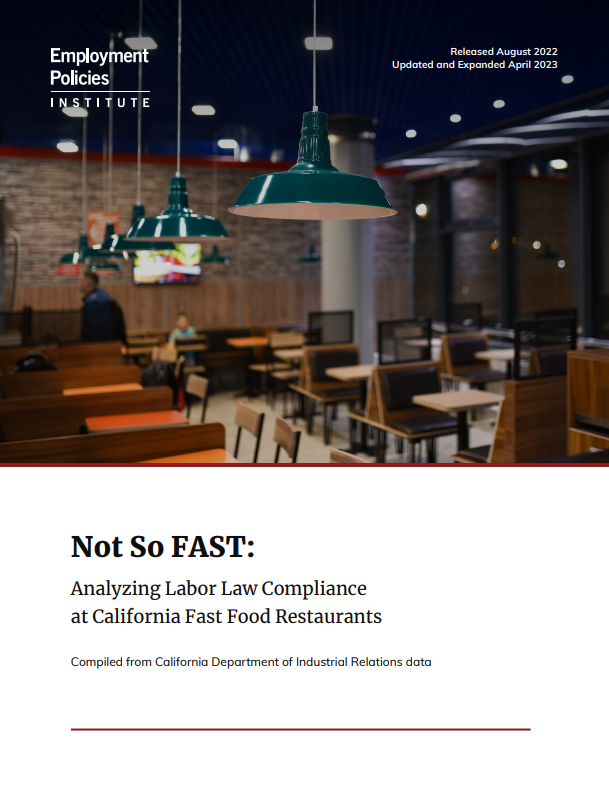Not So FAST: April 2023
Analyzing Labor Law Compliance at California Fast Food Restaurants
Abstract
A.B. 257, the “Fast Food Accountability and Standards (FAST) Recovery Act,” would create a new regulatory scheme for California’s fast food restaurant industry (“limited-service restaurant” or LSR, to use Census terminology).
Subsequent to the passage of A.B. 257, over a million California voters signed a petition in support of a referendum on the law. The law will now appear on the 2024 ballot for voter approval. Undeterred, the law’s advocates in the Service Employees International Union returned in February 2023 with A.B. 1228, which would create joint liability between an independent small business owner (franchisee) who owns a recognizable brand, and the company that establishes the brand’s trademark (franchisor). Similar to A.B. 257, this new bill suggests that franchisee-owned LSRs are more prone to labor law violations than other industries.
This report reviews the largest-possible scope of alleged wage and hour violations as recorded by the California Department of Industrial Relations (DIR), which operates under one of the most complex, extensive labor codes in the nation. Data on wage claims by industry recorded by the state Division of Labor Standards Enforcement (DLSE) are reviewed to compare the LSR industry to all others in the state.
As part of this 2023 update, this report also provides a break-out of the number of wage claims in 2022 made by employees at franchisee-owned LSRs. We also present DIR data covering more than 7,600 lawsuit outcomes under the Private Attorneys General Act (PAGA), California’s unique law providing for employees to directly sue employers for labor law violations.
Our findings include:
- Limited-service restaurants account for only 1.6 percent annually of total average wage claims filed with the state Division of Labor Standards Enforcement (DLSE) for the period 2017 through 2022. (This is less than the industry’s 3.2 percent share of the overall employment in California.)
- The percentage of wage claims from LSR was steady over the years studied, exhibiting no notable pandemic-era spike. Using an adjusted data set that includes restaurant locations potentially miscategorized by the state, limited-service restaurants still average only 2.3 percent of all wage claims.
- Controlling for variances in employment size in different industries, the annual average rate of wage claims in the limited-service restaurant industry is up to five times lower than other industries. Across all years of data analyzed, there was roughly one wage claim per one-thousand private sector employees in limited service–one of the lowest per-employee industry rates.
- In 2022, wage claims from franchisee-owned LSRs represented just two-thirds of one percent (0.65%) of all wage claims filed in the state. This is less than half the estimated share of California employment held by franchisee-owned LSRs. Just 102 franchise LSR establishments experienced a wage claim — representing less than one percent of the 13,366 franchisee-owned LSR locations in the state.
- Reviewing only the investigated claims–or “actual violations” where the state issued penalties against employers–yields a similar result: Total fines assessed against franchisee-owned fast food restaurants represent just four-tenths of one percent of all fines levied statewide.
- Similarly, in lawsuits by employees alleging wage and hour violations under California’s PAGA law from FY13-14 to July FY20-21, the limited-service restaurant industry accounts for just 1.5 percent of total lawsuits in all industries where awards were granted to employees, and only 1.8 percent of all dollars awarded to employees.

